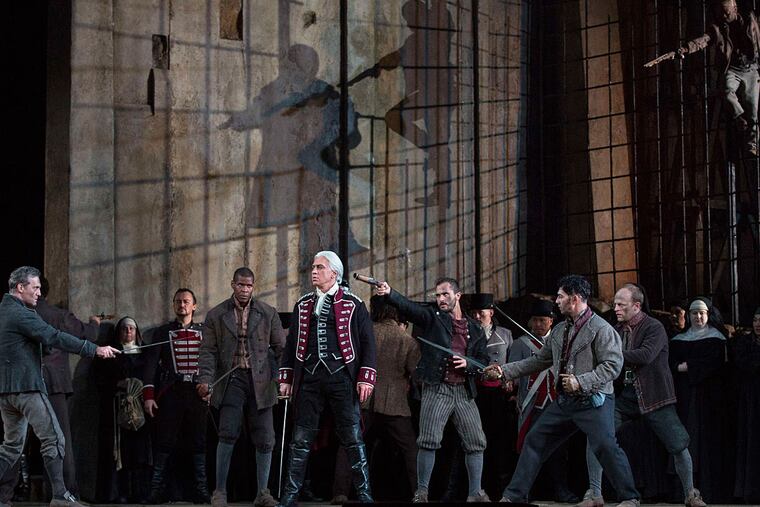10 years of Met simulcasts changed opera's landscape
With enough cameras trained on the Metropolitan Opera stage often enough, something historic is bound to be captured - and possibly was this month with the emotional uproar that greeted Dmitri Hvorostovsky's performance in Il Trovatore.

With enough cameras trained on the Metropolitan Opera stage often enough, something historic is bound to be captured - and possibly was this month with the emotional uproar that greeted Dmitri Hvorostovsky's performance in Il Trovatore.
It was the Oct. 3 opening of the Met's 10th season of HD simulcasts, which are seen in six Philadelphia-area cinemas. The celebrated Siberian baritone was returning after treatments for a brain tumor. Too professional to break character, he fought back a smile while the audience cheered his first entrance. Then he focused on proving that his voice was unscathed by illness.
The chance was worth taking for Met general manager Peter Gelb: "He has delivered some of the greatest performances in recent years on the stage of the Met. We owe him a lot." During final bows, Hvorostovsky was pelted with white roses.
On Saturday, the much-discussed new production of Verdi's Otello, conducted by Yannick Nézet-Séguin, will be beamed out to 2,000 movie theaters in 70 countries - up from 76 theaters a decade ago - with star-in-the-making Sonya Yoncheva and directed by Bartlett Sher, who is acclaimed on Broadway but whose Met history is checkered. Controversy is always vocal in the opera world - and now, through simulcasts, it's global.
"Is everything perfect?" the late soprano Beverly Sills would ask when phoning Gelb, knowing well that opera's many moving parts allow perfection only by an act of God. And talking with Gelb in his remarkably spartan Met office, it's clear he's focused on one thing - creating opera and controlling the damage that may go with it.
With 10 simulcasts a year (each with a later "encore" presentation, and an admission price that hovers around $22, depending on the community, the net profits have been putting $17 million back into the Met's annual budget, which is still laboring with an accumulated deficit. The simulcasts sometimes are among the top-grossing cinema presentations of the week, and, because of the time change in Europe, they occupy the valuable Saturday-night time slot there.
Yet they are a mixed blessing: Some local companies that can't afford star singers and lavish productions complain of being outclassed (even though on Oct. 3, hostess Susan Graham peered into the camera and said, "Visit your local opera company!").
"Companies that are imaginative and connecting with their communities aren't at all threatened by what we do . . . and some companies would be in trouble whether we were there or not," said Gelb.
"The [simulcasts] have lifted everybody's game," said Opera Philadelphia general director David Devan. Rather than trying to compete with the Met, he has differentiated his company with a diversified portfolio containing lots of new opera, though even standard repertoire such as the recent La traviata featured the first Violetta by up-and-coming soprano Lisette Oropesa.
Of course, there's no big-screen surround-sound movie theater experience. "We're just doing that differently . . . with venues [such as the smaller Perelman Theater] that give close proximity to the artist," said Devan. In the other direction, Traviata is to be broadcast on Independence Mall on Friday.
The outreach potential of simulcasts is often said to be stunted by seasoned operagoers snapping up the local tickets. However, the Met created a special student program with opera curricula and free simulcast tickets going to nearly 50 schools nationwide. Another much-debated question: Are simulcasts siphoning away live audiences, or are they laudably extending the opera-going lives of people who can't get to New York?
"The Met was better positioned to experiment in this area than any other opera company. Already, a huge audience of people were used to hearing the Met via radio on Saturday matinees," said Gelb. "It wasn't such a difficult stretch to imagine that some would be willing to go to their local cinemas."
Not that it was easy. "I had to go to the leading singers and get them to buy into this project," he said. "They understood that we needed to try new things." Their agents grumbled about the lack of control singers have over the way the product is managed, later seen on PBS and made available on DVD. Gelb is unsympathetic: "With millions of dollars of expenses, we can't have one person who keeps it from going forward."
Certainly, Gelb's choice of stage directors has been a considerable source of static. But that doesn't keep him from rehiring them. Clearly, he operates with the inside knowledge of what could have worked but did not, especially in his super-expensive Ring cycle by Robert Lepage, damned mightily by some critics. Yet Lepage returns next season with Kaija Saariaho's L'Amour de loin starring Eric Owens because "Lepage is one of the great theatrical geniuses of the world."
Does Gelb have the most impossible job this side of President Obama? "His term is shorter," he says.
OPERAOtelloThe Metropolitan Opera simulcast begins at 12:55 p.m. Saturday at six area movie theaters.Information: 212-362-6000 or www.metopera.org
StartTextEndText